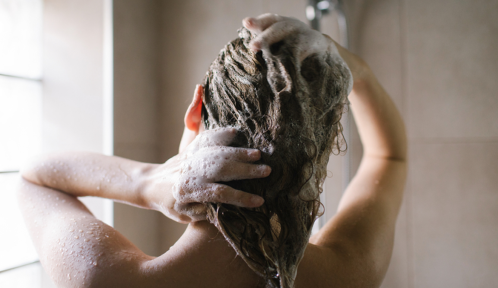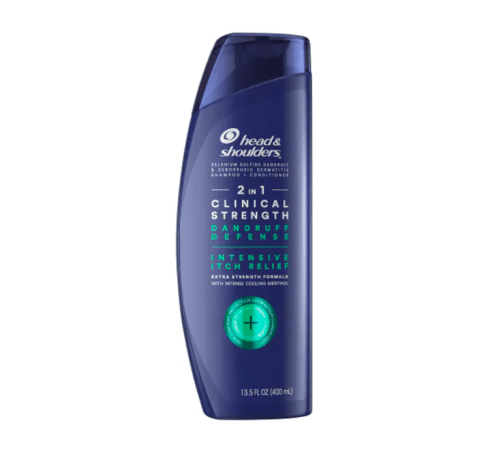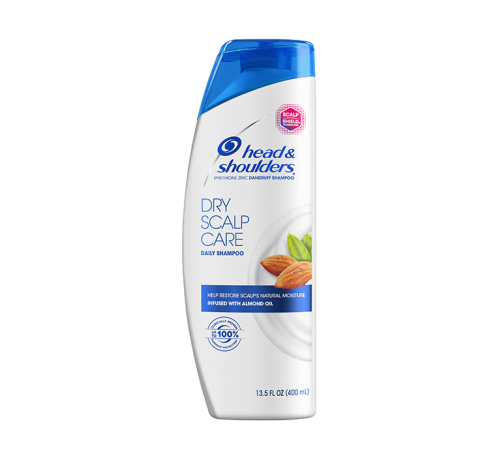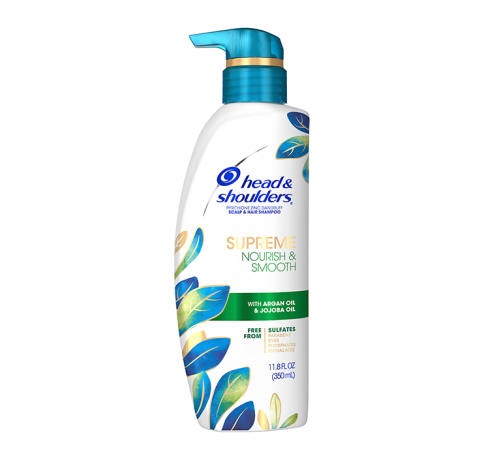advertisement
How, Exactly, Does Dandruff Shampoo Work? A Dermatologist Explains
We all know what dandruff shampoo is, but not how it actually works—so we asked a dermatologist to break down the science.

When you’re dealing with dandruff, the most obvious first place to turn is a dandruff shampoo, right? But, does anyone actually know what’s in the secret sauce they pour into those bottles that makes them seemingly magically banish flakes, sensitivity, and inflammation from your scalp?
Well, it’s actually not such a secret: The flake-fighting powers of most dandruff shampoos center around a few key ingredients. And in order to understand the science-backed, definitely-not-magic way products like Head & Shoulders work, it’s helpful to know what causes dandruff in the first place.
“Seborrheic dermatitis is characterized by flaking and redness—what we typically call dandruff,” says board-certified dermatologist Hadley King, MD, FAAD. “A yeast found on the skin named Malassezia can contribute to the inflammatory response in seborrhea. This yeast feeds on sebum, and therefore thrives in oily areas.” (Aka, your scalp.)
According to Dr. King, anti-dandruff shampoos are helpful because they contain ingredients with anti-fungal properties that help to decrease Malassezia, as well as ingredients that exfoliate to remove the flakes and sebum on which it feeds.
Below, Dr. King is sharing all the details on which scalp-soothing ingredients to look for, but we’ll share a spoiler: You can find them in Head & Shoulders products at Kroger, so starting your road to a healthier scalp is as easy as a quick stop at the grocery store.
Keep scrolling for more dandruff shampoo insight as well as expert recommendations for keeping a healthy scalp.
Shop Dandruff Solutions at Kroger

Head & Shoulders 2-In-1 Clinical Strength Dandruff Defense Shampoo & Conditioner $10

Head & Shoulders Dry Scalp Care Anti-Dandruff Shampoo $6

Head & Shoulders Supreme Sulfate Free Nourish & Smooth Shampoo $12
The ingredients to look for
Two of the main ingredients Dr. King turns to for their anti-dandruff prowess are selenium sulfide and pyrithione zinc, both of which have anti-fungal properties that can help decrease Malassezia as well as keep irritation, inflammation, and itching at bay.
As for which one to choose, you’ll want to consider your hair and scalp goals, as well as the other ingredients in your dandruff shampoo of choice. For people who want some serious help with flakes and itch, the selenium sulfide in Head & Shoulders’ Clinical Strength Dandruff Defense Collection will provide the intensive relief you’re looking for—no prescription required.
For people with an extra dry scalp, opt for the Head & Shoulders Dry Scalp Care Anti-Dandruff Shampoo, which combines pyrithione zinc with nourishing ingredients and fragrant almond oil to keep your scalp feeling healthy and your tresses looking (and smelling) great. Or, if your main focus is keeping your mane looking smooth while still giving your scalp the attention it needs, go for Head & Shoulders Supreme Sulfate Free Nourish & Smooth Shampoo, which uses pyrithione zinc along with jojoba oil and argan oil for a flake-free scalp and super-shiny tresses.
Healthy scalp habits
Now that you’re caught up to speed on how dandruff shampoo works (and the ingredients that fuel them), you’ll want to keep in mind the other aspects of your routine that tend to affect your scalp health.
“People with dandruff sometimes think that their scalp is dry and so therefore they should shampoo less frequently, but this is a misconception,” Dr. King says. “If you are prone to dandruff, then showering less frequently can contribute to a flare. This may be because of yeast on the scalp that contribute to inflammation.”
Since Malassezia thrives in oily atmospheres, maintaining a regular hair-washing regimen (Dr. King recommends at least four times a week) will help keep your flaky flare-ups to a minimum. But even when it happens, you’ll be prepared to take your dandruff head on (pun intended) thanks to your new science-backed know-how.
Want more ways to love your scalp? Learn all about it at Head & Shoulders, and stock up on products at Kroger during your next grocery run.
Sign up for the Well+Good SHOP Newsletter
Get exclusive deals on wellness, beauty, fitness, and food products that have been hand-picked by our editors.
Got it, you've been added to our email list.




